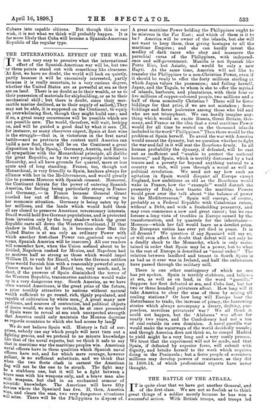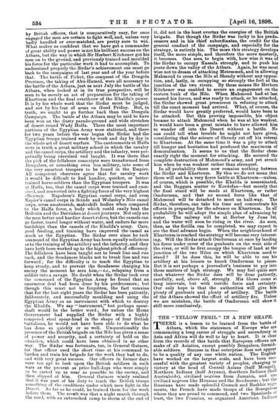THE BATTLE OF THE ATBARA.
IT is quite clear that we have got another General, and of the first class. We are not so foolish as to think great things of a soldier merely because he has won a. successful action. With British troops, and troops led by British officers, that is comparatively easy, for once engaged the men are certain to fight well, and, unless very badly handled or over-matched, are pretty sure to win. What makes us confident that we have got a commander of great ability and power is not his brilliant success on the Atbara, but the way in which Sir Herbert Kitchener got his men on to the ground, and previously trained and moulded his force for the particular work it had to accomplish. To understand properly the Sirdar's achievement one must go back to the campaigns of last year and of the year before that. The battle of Firket, the conquest of the Dongola Province, the taking of Abu-Hamed, were all necessary to the battle of the Atbara, just as next July the battle of the Atbara, when looked at in its true perspective, will be seen to be merely an act of preparation for the taking of Khartoum and the final overthrow of the Khalifa's power. It is by his whole work that the Sirdar must be judged, and not by his feat of arms on Good Friday. But, in truth, we ought to go further back than the Dongola Campaign. The battle of the Atbara may be said to have been won on the dusty parade-ground and wide stretches of desert round Wady Haifa. There the most important portions of the Egyptian Army were stationed, and there for two years before the war began the Sirdar had the Egyptian troops trained week by week and day by day in the whole art of desert warfare. The cantonments at Haifa were in truth a great military school in which the cavalry and the camel corps, the artillery and the infantry, were per- petually being exercised and taught. It was there that the pick of the fellaheen conscripts were transformed from Bengalees, or something even less military, into some of the very smartest troopers to be found in the Empire. All competent observers agree that for cavalry work it would be difficult to find handier, quicker, or better- trained horse-soldiers than the Egyptian troopers. It was at Haifa, too, that the camel corps were trained and exer- cised, and converted into a fighting force of the very highest efficiency. Napoleon's Egyptian camel corps, and even Napier's camel corps in Scinde and Wolseley's Niie camel corps, seem amateurish, makeshift bodies when compared to the Haifa force, a body which could easily beat the Bedouin and the Dervishes at desert journeys. Not only are the men better and hardier desert riders, but the camels can go faster, travel longer without water, and endure far more hardships than the camels of the Khalifa's army. Care, good feeding, and training have improved the camel as much as the Egyptian. The Sirdar ever since he took command of the Egyptian Army has been equally solicitous is to the training of the artillery and the infantry, and they have both been worked up to the highest pitch of efficiency. The fellaheen have been taught not to break line and run back, and the Soudanese blacks not to break line and run forward ; for the difficulty is to teach the Egyptian to keep steady, and to prevent the Soudanese charging his enemy the moment he sees him,—i.e., relapsing from a soldier into a savage. No doubt when the Sirdar took over the command of the Egyptian Army he found that an enormous deal had been done by his predecessors ; but though this must not be forgotten, the fact remains that for the last eight years the Sirdar has been patiently, deliberately, and successfully moulding and using the Egyptian Army as an instrument with which to destroy the Khalifa. We say " instrument," but perhaps spear- shaft would be the better word ; for unless the Home Government had supplied the Sirdar with a highly tempered steel spear-head in the shape of four British battalions, he would not have been able to do what he has done so quickly or so well. Unquestionably the presence of the British brigade on the Nile has given a sense of power and security, and a certainty of hold on the situation, which could have been obtained in no other way. The Sirdar was fortunate, too, in General Gatacre, for that officer used the short time at his command to harden and train his brigade for the work they had to do, and with very great success. Our officers in former days were too apt to look upon the British soldiers in such wars as the present as prize bull-dogs who were simply to be carted up as near as possible to the enemy, and then slipped at him. General Gatacre wisely realised
i that it was part of his duty to teach the British troops something of the conditions under which men fight in the Desert. As far as he could, he trained them for the work before them. The result was that a night march through the sand, with an entrenched camp to storm at the end of it, did not in the least overtax the energies of the British brigade. But though the Sirdar was lucky in his prede- cessors and in his chief subordinates, the credit for the general conduct of the campaign, and especially for the strategy, is entirely his. The more this strategy develops itself, the more simple, and therefore the more masterly, it becomes. One sees, to begin with, how wise it was of the Sirdar to occupy Kassala strongly, and to push his posts down the valley of the Atbara. Again, he was most wise not to dream of attacking Metemmeh, and in allowing Mahmoud to cross the Nile at Shendy without any opposi- tion, and, lastly, in occupying so strongly the fort at the junction of the two rivers. By these means Sir Herbert Kitchener was enabled to secure an engagement on the eastern bank of the Nile. When Mahmoud had at last massed his forces, and was ready to attack, or be attacked, the Sirdar showed great prescience in refusing to attack till the exact moment had arrived. What, of course, the Sirdar would have greatly preferred, would have been to be attacked. But this proving impossible, his object became to attack Mahmoud when he was at his weakest. It would have been a great mistake to have allowed him to wander off into the Desert without a battle. No one could tell what trouble he might not have given, considering that the seizure of Shendy cut off his retreat to Khartoum. At the same time it was a pity to attack till hunger and hesitation had produced the maximum of demoralisation. It seems to us that the Sirdar chose exactly right the moment for attacking. He secured the complete destruction of Mahmoud's army, and yet struck him when he was weakest rather than strongest.
In all probability there now remains nothing between the Sirdar and Khartoum. By this we do not mean that there will not be a very fierce battle at Khartoum—unless, of course, which is possible, the Khalifa is assassinated, and the Baggara scatter to Kordofan—but merely that the final stand will be made at Khartoum, or rather Omdurman, and that no second force like that of Mahmoud will be detached to meet us half-way. The Sirdar, therefore, can take his time and concentrate his efforts in preparing for the advance on Khartoum. In all probability he will adopt the simple plan of advancing by water. The railway will be at Berber by June 1st, and the water will soon be rising in the river. As soon, then, as the flotilla can be completed, we may expect to see the final advance begin. When the neighbourhood of Khartoum is reached the strategy will become very interest- ing. Will the Sirdar attack Omdurman at once by landing his force under cover of the gunboats on the west side of the river, or will he first occupy the tongue of land at the junction of the two Niles on which Khartoum used to stand ? If he does this, he will be able to use his artillery at his leisure to knock Omdurman to pieces. But it is not perhaps a journalist's business to pry into these matters of high strategy. We may feel quite sure that whatever the Sirdar does will be done patiently, carefully, and, above all, strongly. His blows come at long intervals, but with terrific force and certainty. Our only hope is that the authorities will give him plenty of gunboats and plenty of artillery. The battle of the Atbara showed the effect of artillery fire. Unless we are mistaken, the battle of Omdurman will show it still more conclusively.



































 Previous page
Previous page